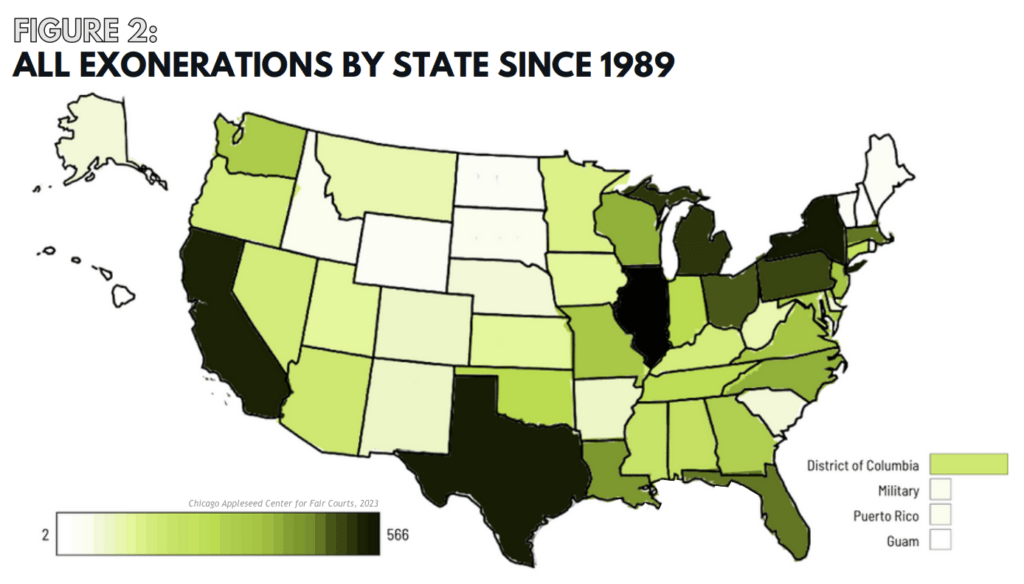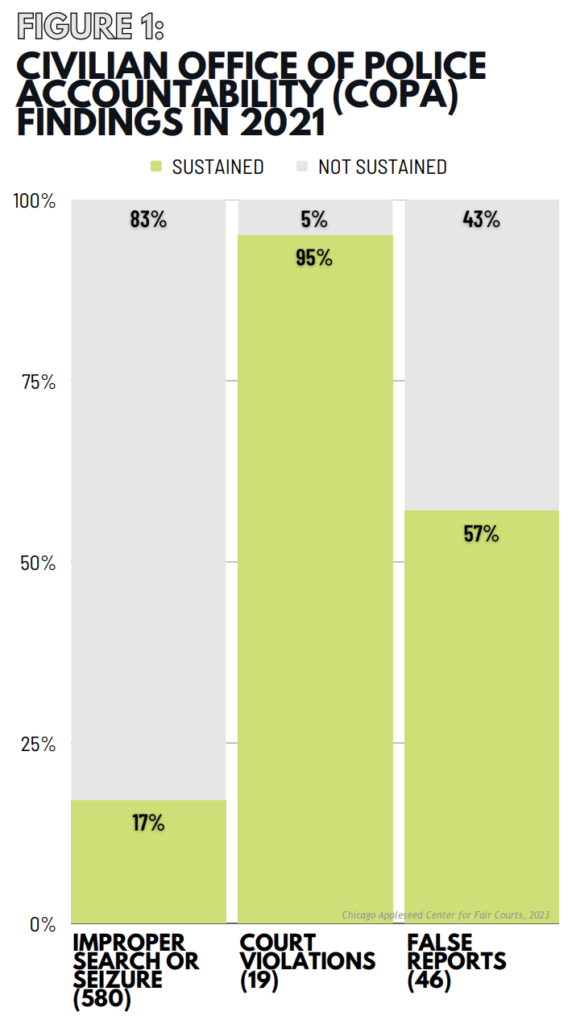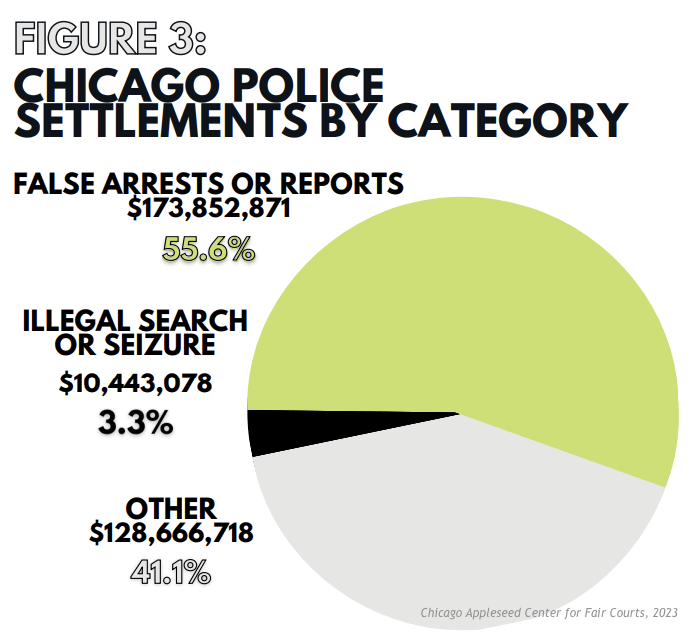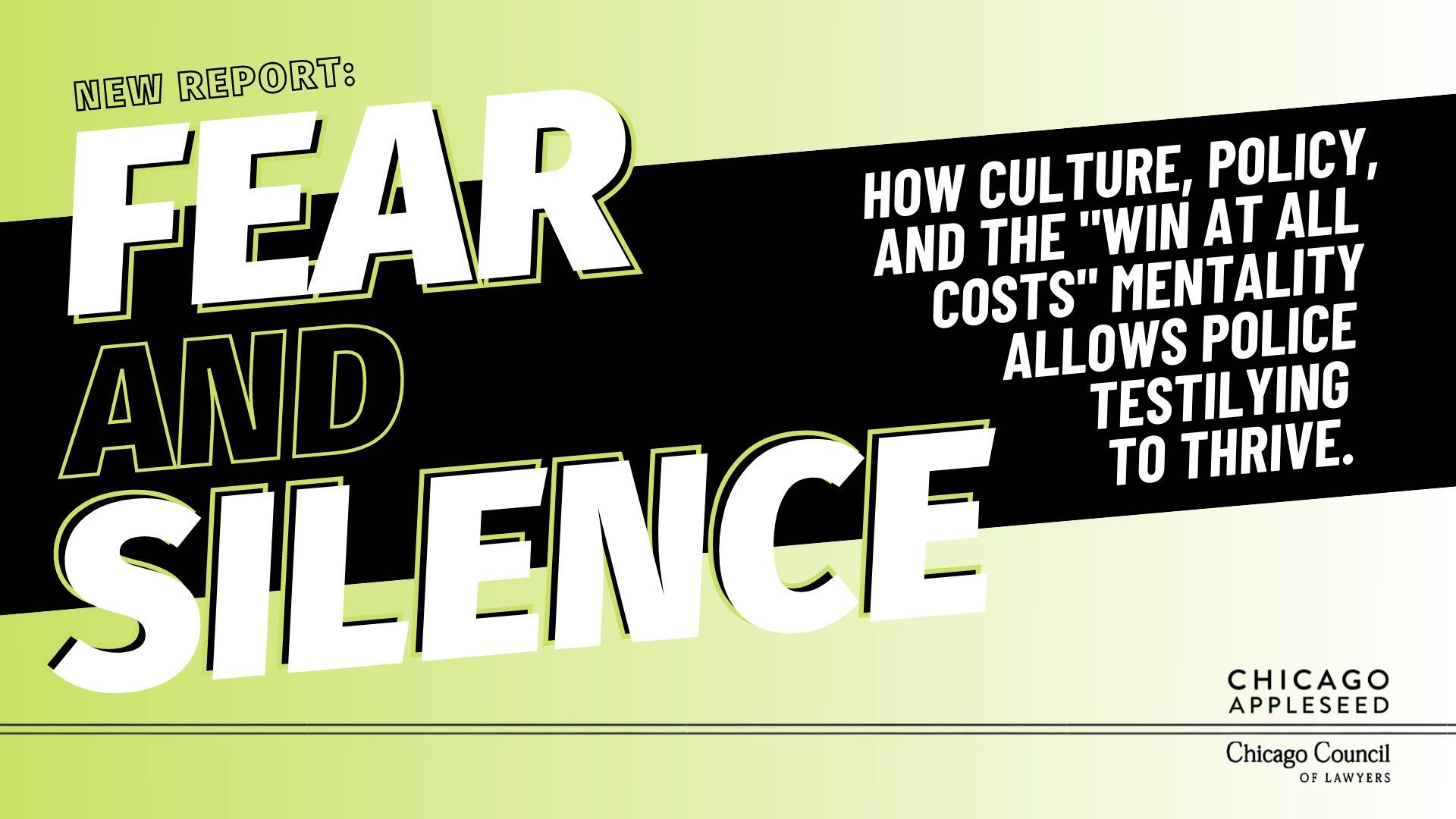NEW REPORT: Fear and Silence – How Culture, Policy, and the ”Win At All Costs” Mentality Allows Police Testilying to Thrive
Chicago Appleseed Center for Fair Courts and Chicago Council of Lawyers work together to seek evidence-based solutions to social injustices. In early 2022, we began researching the issue of false reporting and police perjury — sometimes known as ”testilying” — in Circuit Court of Cook County. Our final report, Fear and Silence: How Culture, Policy, and the ”Win At All Costs” Mentality Allows Police Testilying to Thrive, has now been published. The discussion of topics in this report covers issues in Cook County and throughout the state of Illinois, but primarily focuses on policing in Chicago.
”Police perjury” refers to the specific act of an officer lying in court, whereas “false reporting” refers to any time an officer lies in their official capacity as law enforcement. Although there are numerous protections in place that are meant to prevent police perjury – such as the Chicago Police Department’s (CPD) Rule 14, which explicitly prohibits CPD officers from making false statements or written reports – these protections are often ineffective or compromised. Scholarship routinely demonstrates that police officers frequently misstate facts or lie in court proceedings. Police officers are present at crime scenes and investigations when attorneys, judges, and juries are not, and as a result, the public must rely on officers’ stories when arbitrating questions of guilt or innocence in court. The willingness to accurately recount events that occur outside the courtroom is essential to ensuring fair outcomes for people affected by injustice and police officers are widely seen as credible informants on these events.
Whenever a law enforcement official deliberately chooses to misrepresent facts that are known to them, they create unnecessary barriers to justice that deeply harm individuals, families, and whole communities.
Our report examines personal narratives and hard data to understand how and when opportunities for police to misstate the truth or outright lie arise; what perpetuates these opportunities; and what can be done by institutions and the community to reduce the court’s reliance on inaccurate testimony. The extremely high rate of exonerations in Cook County is a clear indicator of how rampant police dishonesty is in our community, specifically. According to 2017 census data, Cook County leads the country in total number of exonerations: over 230 since 1989; per capita, Cook County ranks second nationally in number of exonerations. Of all exonerations in Illinois since 1989, 78% are labeled by The National Registry of Exonerations with “perjury/false accusations” as contributing factors. In the perjury-related cases where the wrongfully-convicted person was eventually exonerated, 45% of cases were for drugs and 43% were murders.


Police perjury and false reporting is an endemic aspect of the Cook County legal system. The Chicago Police Department, especially, has a long and disturbing history of ignoring police misconduct and rewarding cops who act unethically. When system stakeholders or community members call out perjury and false reporting, the CPD has been known to cause harm to whistleblowers.
While most experts believe that it is a very common occurrence, the frequency of police perjury and false reports are difficult to quantify because it often goes unrecognized and unpunished. Available data suggests that although many official complaints about police dishonesty do result in recommended discipline, substantial percentages of these complaints do not. The Invisible Institute’s Citizens Police Data Project, which collects data on police complaints and discipline released in litigation or in response to Freedom of Information Act (FOIA) requests in Chicago. The database includes 247,161 allegations spanning from 1988 to 2018; of these, only 7% of allegations resulted in any discipline. Just nine reports mention “perjury” in the context of one or more officers being accused of perjury, of which six were sustained or resulted in recommended consequences for the officer.
Likewise, the Civilian Office of Police Accountability (COPA), which acts as the civilian oversight agency of the Chicago Police Department (CPD), releases data on the number of allegations against police officers that are “sustained.” In 2021, COPA notes that 16.9% of closed cases related to allegations of improper searches or seizures, 94.7% were allegations of court violations, and 78.3% allegations of false reports were sustained.

Beyond the impact on individuals, police perjury affects communities’ and society’s perceptions of “justice.” Likewise, police perjury and lying in Chicago affects the community because of the enormous sums that taxpayers spend on settling police misconduct lawsuits. The City of Chicago spent $173,852,871 related to false arrests or false reports between 1981 and 2016; from 2003 to 2016, cases related to illegal search and seizure cost $10,443,078. From 2017 and 2020 alone, the City of Chicago paid over $227 million in police misconduct lawsuits with 21% of cases having false arrest as its primary cause category (although only 4% of lawsuit payouts go towards false arrests).
This money could have been spent on bettering our public schools, our infrastructure, mental healthcare, or other positive community-based interventions, but instead, it was required to alleviate the consequences directly caused by police officers’ misconduct. Taken together, these sources paint a clear picture of systemic police lying at a significant cost to community members.
Generally, our findings describe perjury and false reports as an entrenched feature of our local law enforcement system. Police perjury is an “open secret” within the Circuit Court of Cook County and larger legal system that has devastating consequences for its victims and undermines court legitimacy.
Although court actors we interviewed were very aware of the existence of police perjury, they often expressed a perceived powerlessness to change it. The five major themes identified in our research are as follows:
- Police exert control over a “collective culture” in the courts that prevent them from facing consequences for lying. This “collective culture” fosters “a teammate effect” between the police and court actors – such as prosecutors and judges – who, in theory, have the power to hold police accountable but minimal incentive to do so.
- The “code of silence,” which encourages cops to lie is endemic to the culture of the Chicago Police Department. CPD, specifically, has a deeply-entrenched “code of silence” that has been around for decades. The “code of silence” encourages cops to lie to prevent scrutiny and protect themselves and fellow officers and is upheld by institutional practices.
- Body-worn cameras (BWCs) are a tool to better hold police accountable, but they’re not always used correctly. Much of academic literature seems to primarily view BWCs as having a positive impact on policing and exposing police misconduct. Yet, there are many issues that arise in terms of how well police officers utilize BWCs, the consequences cops may face when they fail to use the technology properly, and how, if at all, that footage is exposed to and accessed by the public.
- Brady lists and “Do Not Call” lists are important to avoid relying on testimony of cops who lie, but these lists are underutilized. These lists are compiled by a prosecutor’s office and contain names of cops that have been dishonest in the past and should no longer be trusted. Brady lists and “Do Not Call” lists are very rare, and in Cook County specifically, there is a clear lack of accountability and public transparency with respect to their use.
- Cops who lie rarely face consequences, but the people impacted by these lies are punished severely. While there are rarely punishments for officers who lie, there are devastating consequences for others when perjury occurs: People are wrongfully involved in the legal system or convicted, whistleblowers are ostracized or fired, and judges may even be pushed from power.
Based on these findings, we’ve offered several recommendations to alleviate the issue of police perjury and false reporting in Cook County. These recommendations include, among other policy changes: increasing scrutiny around search warrants; ensuring that body-worn and dashboard camera footage is publicly accessible; giving the Office of the Inspector General authority to overrule the Chicago Police Department’s Bureau of Internal Affairs’ disciplinary findings; and creating a commission to investigate the issue and determine ways to to encourage accurate testimony, ensure accountability, and increase trust in the system.
Our research shows that police perjury and false reporting are deeply-rooted features of policing in Cook County—especially in Chicago. Police officers have enormous incentives to lie and will continue to do so until the punishments for their actions outweigh the social, financial, and career rewards.
While this report has many policy recommendations, prime among them is for the court to create a commission of court actors, advocates, oversight agencies, and community members to encourage accurate testimony in the Cook County Circuit Court. When police perjury and false reporting occurs, it creates cycles of injustice that make court outcomes unfair for individuals (accused people, victims of harm, and their families), make the legal system inaccessible for communities, and reverberate consequences to society at large. In order to remedy this issue, stakeholders must convene with the goal of ensuring that all people involved in the Cook County justice system are met with just and prudent practices.

